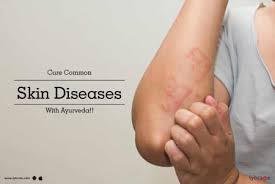
Skin diseases encompass a wide range of conditions that affect the skin's appearance, texture, and overall health. As the body's largest organ, the skin serves as a protective barrier against infections, pollutants, and external elements. Common skin issues include acne, eczema, psoriasis, dermatitis, and fungal infections. Factors such as genetics, lifestyle, hygiene, and environmental exposure can contribute to skin disorders. Early diagnosis and treatment are crucial in managing symptoms and preventing further complications. Maintaining a proper skincare routine, consuming a balanced diet, and seeking medical advice from dermatologists are effective ways to ensure skin health. Understanding the causes and symptoms of skin diseases can help in choosing appropriate treatments, leading to healthier, clearer skin.
Causes of Skin Diseases
- Genetics:
- Allergies:
- Infections:
- Hormonal Changes:
- Lifestyle Factors:
- Environmental Factors:
- Redness, itching, or swelling
- Rashes or bumps
- Dry, cracked, or peeling skin
- Pain or discomfort
- Blisters or sores
- Discoloration or pigmentation changes
Some skin conditions like psoriasis and eczema may run in families.
Allergic reactions to foods, plants, or chemicals can trigger skin issues.
Bacterial, viral, and fungal infections are leading causes of skin diseases.
Acne is often triggered by hormonal imbalances, particularly in teenagers and pregnant women.
Poor hygiene, stress, and unhealthy diets can contribute to skin problems.
Exposure to pollutants, UV rays, and harsh chemicals can harm the skin.
Symptoms of Skin Diseases
Diagnosis and Treatment
A dermatologist can diagnose skin diseases through physical examination and sometimes skin biopsies or allergy tests. Treatment options vary depending on the condition and severity, including:
- Topical Treatments:
- Oral Medications:
- Lifestyle Modifications:
- Light Therapy:
Creams, ointments, or gels for skin irritation or infections.
Antibiotics, antihistamines, or corticosteroids to treat severe conditions.
Maintaining proper hygiene, using skincare products, and following a balanced diet.
Phototherapy for chronic skin conditions like psoriasis.
Prevention Tips for Healthy Skin
- Maintain a consistent skincare routine using gentle, non-irritating products.
- Stay hydrated and follow a nutrient-rich diet.
- Protect your skin from UV radiation by wearing sunscreen.
- Manage stress through relaxation techniques like yoga or meditation.
- Avoid smoking and limit alcohol consumption.
Conclusion
Skin diseases can affect not only your appearance but also your mental well-being. Early diagnosis and appropriate treatment are crucial for effective management. Consult a dermatologist for personalized advice and explore both medical treatments and natural remedies to keep your skin healthy. Prioritizing skincare and adopting a healthy lifestyle can prevent many common skin conditions and promote long-term skin health.